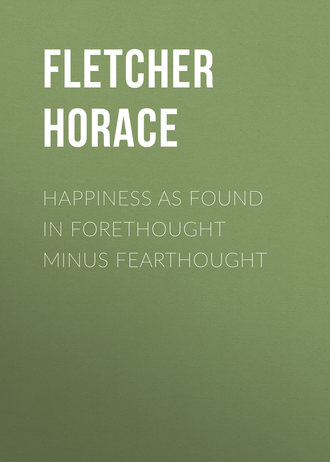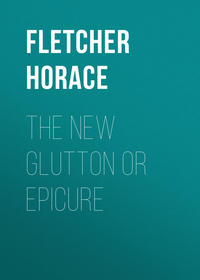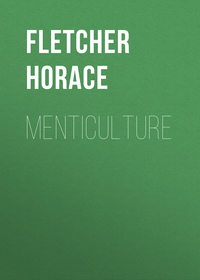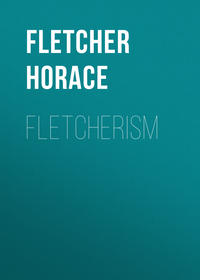 полная версия
полная версияHappiness as Found in Forethought Minus Fearthought
While it is true that "perfect love casteth out fear," it also is true that there can be no perfect love until there is first perfect freedom from fear, so that the right way to approach the problem of creating the harmonious condition in the human mind wherein growth ripens in happiness, is to take the mind when it is returned to us at the moment of awaking from sleep, when it has been purified by contact with Spiritual Cerebration, and protect it from that time forth through each day, by refusing to import suspicion, anger or worry into it, a process that is easier than not, and pleasanter and more profitable than any.
Each day, the tendency to import, which is the only part of the process of eradication that is in any way real, will become less strong, and, with even the weakest attempts to discourage it; but if you are sufficiently in earnest to say, "Begone, you tempter," and thereby slam the door in his face, you will accomplish freedom at once.
The self-infliction of fearthought is a shoveling-in process – all that you have to do to become free from it is to stop shoveling. It is easier to stop importing fearthought, and anger, and worry, and suspicion, than it is to import them; therefore,
Stop importing!
THE IMPOTENCE OF PAIN
During the Japanese-Chinese war, two Japanese students were arrested in Shanghai on the charge of espionage, and were taken to Ningpo and tortured to death.
The method of torture was the most cruel known, and included a slow crushing of the most sensitive parts of their anatomy.
The young patriots displayed such heroism under the torture that the incident gave rise to considerable discussion as to the relative sensitiveness of the Mongolian and the Caucasian races to pain. The consensus of the opinion that I saw expressed, which was, by the way, Caucasian opinion only, was that the Oriental was less sensitive, and therefore was not entitled to as much credit for withstanding pain as the self-adjudged, more-sensitive Westerner.
The truth of the matter is, that there is a limit to actual pain within the power of any one to endure, if the element of fearthought-of-more-pain is eliminated, so that the absorbing heroism of the patriot – almost courting torture for the honor of his cause – puts the element of fearthought out of the case, and leaves only the actual sensation to be suffered. Pain is undoubtedly intended as a warning of disordered conditions, and not as a punishment, and, having performed its mission, is relieved by a kind paralysis before the shock is too severe for human endurance.
This is the beneficent provision of the natural law, but when it comes to the exercise of unnatural fearthought, there is no limit to the torture a victim may impose upon himself, and, on a basis of a very little real pain, build up most terrible suffering.
The author has tested the truth of this assertion personally.
Being condemned to submit to a dental operation of unusual severity, the opportunity to experiment was gladly availed of, even at the expense of comfort.
One special aggravation of the operation was the prying open of the mouth, in order to build up from the root one of the teeth located farthest back in the mouth. The mouth was not large enough to suit the facile convenience of the dentist, and hence he made use of all the skill and power he possessed to enlarge the cavity, and having stretched it to the utmost, firm wedges held it open, without possibility of protest, for three hours on a stretch; and on these instruments and conditions of torture I had ample opportunity to experiment; so sufficient – for all practical purposes – that I do not feel it necessary to repeat the experiment, even in the interest of scientific investigation.
The experiment proved, however, my contention, that even the greatest possible pain is of itself not very severe, and that it requires but a slight diversion to make one forget it, for the time being, entirely. I was able, at any moment of the combined irritation, to concentrate my mind upon some subject or object, and to lose the sense of pain out of my consciousness altogether – and at will.
Major General O. O. Howard, U. S. A. (retired) has recently corroborated, to the author, out of his own experience, the possibility of forgetting pain through slight diversion. He lost an arm during the Civil War, and in the process of recovery some of the nerve-ends were not properly cicatrized, so that ever since the wound healed the General has not been free from the sensation of pain, whenever his mind has reverted to it, and yet he is able at any time to forget it by change of thought.
In like manner, fear-of-trouble is the major part of all the so-called trouble that is experienced. As intimated in the "definitions," under the caption of "Trouble," there are few real conditions that are very uncomfortable, if apprehension of still more uncomfortable conditions is not imported to exaggerate the existing discomfort. Fear of freezing to death or of drowning may be made very terrible, for instance, whereas the end in freezing and in drowning is known to be so comfortable, and even blissful, that those who are on the point of passing out of life by those means dislike to be called back to life again.
The heroism of mothers in the event of child-birth is too well known to call for reference, but there is the greatest difference in the ease or in the discomfort of the condition attending the process, which is largely influenced by the feeling of welcome or the attitude of aversion with which the new-comer is greeted by the mother.
The point-of-view has much to do with the sting of pain. Whoever has suffered that severest of all spankings, the water spanking incident to a clumsy dive, or a wrongly-calculated somersault into the water from a wharf, or from a natatorium springboard, will remember that the pain of it is not half so hard to bear as the form of parental correction called by the same name, that in itself is not nearly so severe.
Sensitiveness to pain is largely due to the fear of pain, and a reversal of the accustomed attitude towards fear will have an immediate effect upon the severity of pain by mitigating much of its sting. Christian scientists, mental scientists, spiritual scientists, faith curists, and all others who practice mental therapeutics in physical diseases, escape much suffering in this way, and the happy result of this attitude towards pain serves to strengthen their faith.
Whatever the cause of the relief, it is good, for it teaches, in a most practical way, the potency of thought in overcoming, or, dismissing, real pain as well as all imaginary evil, and also the possibility of eliminating fearthought from the mental equipment, by showing how impotent to harm are the realities that inspire it, when it is prevented from exaggerating them.
UNHAPPY UNLESS MISERABLE
There are some persons, in fact, a great many persons, who are not happy unless they have real or fancied cause for complaint. Martyrdom is the recreation of such people and they are liable to be more greedy for recreation than those whose recreation is of a joyous sort.
It is certainly a misplaced kindness to impose unwelcome attentions on any one. In the category of nuisances unwelcome attentions are perhaps the most disagreeable, and to cram joy down the maw of one who has no taste for it, is as rude, and even vulgar, as insisting that he shall eat something that is nauseating to him.
It is true that persons who gloat over misery; who love to mope about in grave-yards; and are forever telling grewsome tales for the supposed delectation of their victims, are not as agreeable to others as they seem to be to themselves, and their presence at festivals and other ostensibly joyous occasions may be looked on as discordant, and, as such, out of place.
In these times of license, which are sometime mistaken for times of unusual liberty, it is not for anyone to define what is altogether bad, nor to confine good, nor good taste, within too narrow limits; neither is it generous to prescribe anything that shall be universally eaten or worn; and, above all liberties, the liberty to wear a smile or a frown should prevail; but it is within the province of organized society to put its stamp of approval or disapproval on the time and place for appropriate use of them. Certain costumes are suitable in certain places and not suitable in others. For example, the bathing suit and the night-robe have uses that are appropriate for their special purposes, but they would not be tolerated on the street by the police, and it would be no greater curtailment of liberty to order that frowns shall be worn only in dark places and not be permitted to cloud the sunlight, than that undue levity should be tabooed on occasions considered to be serious. If such prescription were to be imposed, it would be necessary, of course, to furnish dark places at appropriate, or, rather, convenient intervals, for the use of the miserably inclined, in the same way that spittoons are provided for the use of those who must expectorate sputum.
Liberty is so precious a thing that it must be protected as the holiest of our possessions, and even if it lap over into the debatable ground sometimes called license, it should yet be protected, and therefore the permission to wear frowns in appropriate places and to enjoy being miserable in the privacy of one's own chamber should be respected; on the street, or anywhere in public, however, they should not be tolerated, for they are harmful generally, and particularly injurious to children.
As individuals, those of us who accept God's promises as truths, who prefer to live in the sunlight rather than in a cave, who glorify Appreciation as the first and best suggestion in the language, who believe that growth is the object of life, that its fallow field is harmony, and that its fruit is happiness, and also those of us who, by comparison of conditions have learned to believe that our pessimistic friends can be happier than they are, and can become better companions and citizens by a change of attitude towards life, although we may not pass laws of restriction against the frown-habit or against the misery-habit, can use the gentle method of counter-suggestion to good effect, and even go so far as to laugh at and otherwise ridicule the misery-habit, if by thus doing we may possibly correct that which logic has failed to cure.
From long observation it has become evident that the misery-habit feeds on sympathy. Children, who are the best examples of honest expression that we have, whereby to see ourselves in an unartificial light, will not continue a mad or a surly crying spell if they are sure it is not producing a sympathetic effect. If they think they are not heard they will at once cease crying. In the same way, grown persons who practice the misery-habit in public take a rest when they are unobserved. They try to hide it, but they are frequently caught in the act of unbuttoning their pouts, and thereby allowing their faces a rest, as soon as they have thought themselves out of sight. We must believe, if this observation be correct, that the object of pessimism, or, the misery-habit, is generally to secure, by dishonest means, selfish attentions that are not earned, and for which no value is given. There are cases no doubt where the misery-habit has been acquired by contact with respected ones who have been the cause of perverse suggestions too strong to be resisted, and for such there can only be pity, and in the cure of whom gentle and loving suggestion should be used, but to the perverse and the chronic practicers of the misery-habit, no toleration is good, for it is on that, and unmerited sympathy, that they live and thrive. On such, all of the misery possible to be scraped up from the discords of life should be dumped, and they should be condemned to herd together, and if it were possible, they should be isolated, as lepers are isolated, from healthy society.
Sometimes the victim of the misery-habit practices the habit only within the family. This is especially severe on the family, and is much more difficult to treat. The family is at once the seat of the greatest liberty, and the home and breeding-ground of the greatest tyranny. The family is supposed to be under the holy protection of the divine principle of love, but if that principle is not a possession of the family, there is no protection whatever from most inhuman practices, but instead a license to the cultivation of most discordant passions. It is in the family that mollygrubs are grown and tolerated. It is in the family that one cannot get rid of them by running away, for the family, like the poor, you have with you always. And who would have it otherwise? The whole tendency of civilization is to appreciate the family more and more, and to cultivate respect for the family model as the basis of good government. But it is the very security of the natural, and therefore indissoluble, bonds that gives the selfishly inclined opportunity to practice the misery-habit without fear of being thrown out, left behind, cremated or otherwise gotten rid of, as dead and disagreeable matter is usually treated, in civilized communities.
The symptoms of the misery-habit, or martyr-habit, are easy to detect, for while they may be cultivated and laboriously practiced in private, they are intended to be seen, and are displayed at times when they are calculated to be most conspicuous. The victim of the martyr-habit is usually an industrious person. He, or possibly she, will perform any amount of necessary, and even unnecessary, manual labor, in order to exhibit martyr-like fatigue; is always hanging behind in order to be slighted; condemns attentions honestly intended as perfunctory politeness; interprets praise as being patronage; finds any part of a chicken served him at the family table the worst piece, and at the same time assures the carver that he has been unduly partial or over-generous – but, with a tone of voice or an expression of countenance that belies the utterance. A common phrase of the afflicted martyrite is, "Don't mind me," and hysterics is the favorite amusement, while pain and trouble are the chief stock in trade. And is there a remedy? Yes.
If Christianity were to be measured by the optimism of the Master, if the gauge of optimism prescribed by the Master were to be used to measure professing Christians for the name; if cause and effect were to be placed in their true relation to each other, and the ills we cultivate were to be classed as self-imposed causes and not effects; and if the unnecessary and unprofitable were to be ranked as not-respectable; the misery-habit or martyr-habit would cease to be fashionable, mollygrubs would disappear, and the principal breeding-ground of pessimism – the family – would be purified, as becoming to its holy office.
THOU SHALT NOT STRIKE A WOMAN
If a queer sort of human being, dressed in a costume we had never seen before, and hailing from some island we had never heard of, were to land on our shores and ask our protection and the privilege of teaching the religion of his people; if he were to learn our language sufficiently to convey his ideas to us; if he were to have printed the formulas of his religion, and, among them, his deity's commandments to men; if the first of these commandments were to read, "Thou shalt not strike a woman," what would we say to such a commandment? and what would we think of a people who found it necessary to have such a formula?
Our question would naturally be, "Do the people of your country ever strike women?"
In our particular state of chivalric civilization, striking women is one of the things so entirely out of the question that we do not consider it even a possibility, except in cases of insanity or of drunkenness, where the brute of the moment is not responsible for his action.
The very fact of its being an impossible, and therefore unmentionable, crime is the strongest suggestion against it.
If "Thou shalt not strike a woman" were listed in the category of commandments, and were constantly repeated as something hard to resist, and hence commanded against, I believe the crime would become common in circles where it is not thought of as possible now.
The best thing to do with a condemned thing is to cover it up, seal it up, and relegate it to the custody of the awful, unwritten law of unanimous disapproval.
It is said that when the Jesuit fathers went to Japan at the end of the sixteenth century they were warmly welcomed, and not only were permitted but invited to teach their religion.
One of the first things they did was to have the ten commandments of the old Mosaic law printed in Japanese, in the form of what we call a tract, and distributed among the people.
Reading was then, as now, a common accomplishment with the Japanese, and they were interested in the tract. They did not quite understand its purport, however, and one of their number was delegated to ask for an explanation.
Japan is the land, above all others, where poetry and flowers and idealism and art and other refinements are cherished and appreciated. Poetry, in Japan, is sometimes so idealistic that it is somewhat vague to any but the poet. It is the custom, therefore, to consider that anything not quite comprehensible must be poetry; and not understanding the tract of the fathers, the Japanese naturally thought it to be a specimen of Portuguese poetry.
Approaching one of the fathers, the spokesman of the people bowed with accustomed politeness and said: "I trust you will pardon the wretched ignorance and dullness of my humble self, but the great interest of my companions, as well of myself, in your poem, impels us to ask you to interpret to us the great depth of its beauteous crystalline sweetness, in order that we may enjoy it as it is worthy of being enjoyed."
The father was shocked to hear his sacred commandments classed as worldly poetry, and, drawing himself up to the full impressiveness of holy indignation, replied, "That is not poetry; that is what our God commands that we must not do."
"Sayo de go zarimasu, gomen na sai," answered the spokesman in the polite idiom of his country; "but —do the people of your country ever do these things?"
Whether the Japanese are, or were three hundred years ago, as exempt from evil as the enquiry about the ten commandments would imply, matters not. The rebuke was well merited and taught a great, good lesson. We are the sum of our impressions, and the suggestions we receive from experience are the source of our impressions. Some suggestions are so respected that they make deep impressions, notably the suggestions given us by our parents at our most impressionable age; but all suggestions have some weight, and to such purpose that a thing we know to be untrue becomes a reality to us by constant repetition, as attested by the common expression, "He has told that story so many times that he has come to believe it himself."
There is scarcely any difference of opinion about the justice of the ten commandments; but the constant repetition of "you must not" is like shaking a red rag before a wild bull, to many self-assertive children; whereas, if the things to be commanded against were understood to be impossible, and therefore unmentionable, the commandments would come to fit crimes that had become as much out of date to us now as is the crime of striking women.
We have constant evidence of the fact that beliefs, or, rather, habits-of-belief, follow persistent assertion, and that character is largely molded by existing formulas as well as other influences of our environment.
Without desire to criticise the formulas of any creeds, except in the way of counter-suggestion, I would ask, "What would be the probable effect of teaching the constant repetition of the eleventh commandment in place of the older ten? – 'A new commandment I give unto you, that you love one another.'" It is impossible to love and to hate at the same time. It is impossible to obey the eleventh commandment and disobey any of the ten at the same time. Is it not better practice of suggestion, in order to form habit-of-thought, to repeat the eleventh commandment eleven times, than to repeat each of the ten once and the eleventh only once?
It is true that the easy way to attain good is to cease to have evil, but, it is a poor way to cease to have evil to nurse it in the memory as a thing difficult not to have.
If there is to be repetition of anything, it is better that it should be of such suggestions as "Appreciation" and "Love."
The mind is as amenable to the force of habit as are any of the physical members of the body. The soul is much more amenable to suggestion than either, for it is much more impressionable. If you were teaching a child to play the piano, would you have him run all the scales, or, rather, combinations of notes that do not form scales, that are to be avoided in music, in order to teach him the habit of not playing them? Would it be good teaching to have him habituate his fingers to the sequence of false scales as well as to the sequence of true scales? May not the constant repetition of the commandments that refer to lewd practices suggest thoughts about lewdness that never would come to young minds by other means, and therefore taint pure thought, in brutal fashion, by vile suggestion?
THE POINT-OF-VIEW
Suppose two men of equal physical strength were to start in a thousand-mile bicycle race. Suppose one of the men were to greet the passing of each mile-post in this wise: "Only nine hundred and ninety-nine miles more; only nine hundred and ninety miles more," or whatever the distance covered might be at the time. Suppose the other were to greet the same mile-posts otherwise, as "only one mile;" or, "hang it, only ten miles." Which racer would win?
In effect, one of the men would be going down hill and the other would be going up hill, and just that difference of approach would win the race for the person who was rolling down from one thousand miles to one mile, from the person who was struggling along the upward course from one mile to a thousand miles.
Suppose two men were to each feel a pain in the joint of his big toe. Suppose one of the attacked ones were to greet the pain as follows: "Well! I suppose that means the gout, and I am to be afflicted for the balance of my life with that horrible disease. What have I done to deserve such a fate? I suppose some of my ancestors are responsible for this, but I will have to suffer for it all the same." Suppose the other victim were to greet the same symptom in himself differently, as follows: "Hello, old fellow, what does all this mean? – too much rich food, too much rich wine, too much of everything that is good to the taste and bad for the stomach. Well, I might have expected it. Am ever so much obliged to you, Mr. Pain, for having warned me so promptly; I'll take the hint and correct the error before the trouble gets seated. Keep me well posted, Mr. Pain. If the disorder does not disappear, please keep on prodding me so that I will know if I am doing the right thing or the wrong thing towards it." Which of these men would recover more quickly, and which of them would suffer more discomfort?
There are always different points-of-view and different attitudes towards every problem of life. The different points-of-view are always in competition, and, other conditions being equal, winning or losing is a question of attitude. The attitude that is directed by appreciation, gratitude, hope, trust, or any of the attributes of Forethought, will always win, as against the attitude that is handicapped by any shade of Fearthought.
Life may be filled with disappointments or with successes merely by the choice of point-of-view, the pessimistic point-of-view leading from disappointment to disappointment, and the optimistic point of view leading to a succession of successes. As a man thinks, so does he act, and so does the world help him to act.
Evolution never places obstacles in the right road. A seeming obstacle may be but a hurdle, the clearing of which may win a prize in the life race. Some one has said that the supreme obstacle in life is surmounted by aid of the progressively difficult smaller obstacles that are overcome with increasing ease, and which, if their beneficent uses are known, become only hurdles instead of obstructions.







